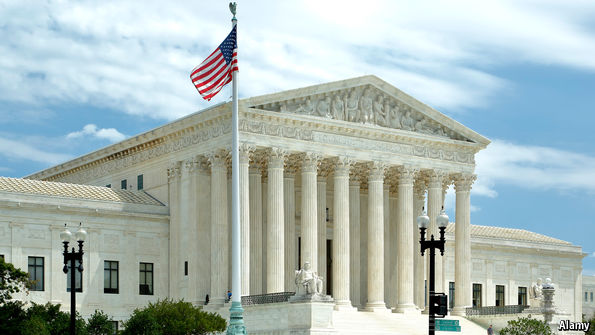
A BASIC principle of electoral democracy is that the people pick their leaders. But by tweaking the rules—such as those which govern which forms of identification voters need; when the polls are open; how the ballot is composed—incumbents can tip the balance in favour of one party. Republicans have been particularly active in this endeavour in recent years, crafting rules that make it more difficult for blacks, Hispanics and the poor—core Democratic constituencies—to exercise their right to vote. Most courts to consider challenges to these laws in recent months have rejected them as violations of the Voting Rights Act or the 14th Amendment, or both. Now some of the losers in those cases are trying their hand at one last appeal—to the United States Supreme Court. They are bound to be disappointed.
The justices have so far acted on one petition, rebuffing North Carolina’s request to let it implement five voting changes that an appeals court had condemned as “target[ing] African-Americans with almost surgical precision”. On August 31st, the eight-member Supreme Court, stuck without a ninth justice since February when Antonin Scalia died, divided 4-4 on the Tar Heel state’s request. The four conservative justices, as expected, voted to allow North Carolina to implement most of its voting restrictions, but none of the liberal-leaning justices opted to provide the fifth vote necessary to issue a stay. “Four liberal justices blocked North Carolina protections afforded by our sensible voter laws”, Pat McRory, North Carolina’s governor, said in response. With no remaining avenue of appeal, North Carolina is compelled to revert to less stringent photo-ID rules, keep its number of early voting days at 17 (rather than 10) and retain a programme that preregisters voters on the cusp of their 18th birthdays. Each of these averted changes, the Fourth Circuit Court of Appeals noted in its late-July decision, had been written into the statute after Republican lawmakers requested and surveyed data on the behaviour of black voters. But their plan to scrap the voting procedures that blacks rely on most has itself been scrapped by the federal courts.
Two more vital states in the 2016 election have put similar requests before the Supreme Court. Ohio Democrats upset by a ruling from the Sixth Circuit Court of Appeals are asking the justices to restore a so-called “Golden Week”—five days during which Ohioans can both register to vote and fill out a ballot on the same day. The appeals court panel observed that even with the reduction of early voting from 35 to 29 days, a change that came in 2013 after several election cycles with Golden Week, Ohio has one of the most generous pre-Election Day voting spans in the country. (Thirteen states, including New York, Connecticut and Pennsylvania, offer no early voting at all.) It is untenable, the Sixth Circuit said, for states trying out longer early-voting periods to be wedded to those changes forever. But Democrats in Ohio cite evidence that blacks disproportionately take advantage of Golden Week; they say that eliminating the convenient October registration and voting period amounts to racial discrimination. Election-law expert Rick Hasen finds this argument less persuasive than challenges to voting laws in other states and predicts that the Supreme Court will permit Ohio’s fall election to remain ungilt. Elena Kagan, the justice assigned to the Sixth Circuit, ordered the state to respond to the challengers’ case by 3pm on Thursday, September 8th.
Another looming deadline is facing plaintiffs in a Michigan lawsuit involving the design of the ballots voters will encounter in the fall. On July 21st, a federal judge said that an effort by Republicans to eliminate straight-ticket voting—which allows a person to vote for every candidate from a particular party in one fell swoop—would unfairly affect blacks. African Americans frequently use the option to vote for the Democratic slate, the judge noted; requiring them to mark a dozen or more boxes on a ballot would exacerbate already long lines in majority-black polling places and curtail the community’s right to vote. This holding was upheld a few weeks later by a panel of the Sixth Circuit and on September 1st, a majority of that court (with six judges registering their dissent) refused to reconsider it. That leaves the Supreme Court as the state’s last possible recourse, and Michigan has told Justice Kagan that an emergency stay would have to be issued by September 8th in order to allow the state to send the correct ballot off to be printed. If the justices intend to bow to this deadline, they will have to act quickly; the plaintiffs’ written response to the state’s appeal is due on September 7th by 10am.
Asking for 11th-hour emergency stays from a Supreme Court that is split down the middle on the legality and constitutionality of voting restrictions carries a whiff of desperation. It is also laden with irony: the same Republican party that has refused to consider Barack Obama's Supreme Court pick on the grounds that the American people should have a say in choosing Mr Scalia’s replacement is now imploring a short-handed and ill-equipped Supreme Court to come to the rescue in attempts to suppress votes in the November election.

No hay comentarios.:
Publicar un comentario